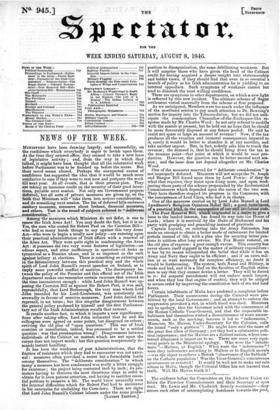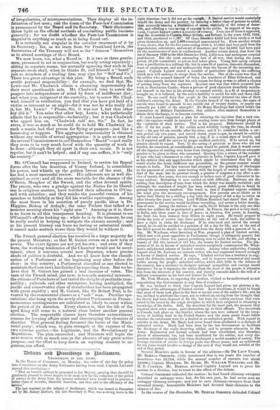The evidence before the Committee on the Andover Union ex-
hibits the Poor-law Commissioners and their Secretary at open feud. Mr. Lewis and Mr. Chadwick fiercely recriminate—they accuse each other of contemplating harshness towards the poor,
of irregularities, of misrepresentations. They display all the in- fatuation of lost men ; and the doom of the Poor-law Commission is pronounced by the Board and its Secretery. Theft disclosures throw light on the official methods of conducting public business generally ; for we doUbt whether the Poor-law Commission is singular in anything so much as in being found out.
It is certainly not singular in the cavalier treatment of it by its Secretary ; for, as we learn from Sir Frankland Lewis, the Secretaries of the Treasury will not so far " demean " themselves as to attend meetings of their Board.
We now learn, too, what a Board is. • It is two or three gentle- men, presumed to act in conjunction, but really acting separately ; Sitting in separate rooms, but mutually agreeing that each in his separate room shall, when he thinks fit, call himself a just as members of a trading firm may sign for "Self and Co." There is a great advantage in this plan. By being a Board, each avoids personal responsibility : for example, we find that Mr. Lewis and Mr. Chadwick obtain a charming impersonality for their most questionable acts. Mr. Chadwick tries to screw the paupers into independence of mind by force of indifferent diet ; and when you, indignant at the austerity, try to screw Mr. Chad- wick himself in retribution, you find that you have got hold of a victim as innocent as an angel—for it was not he who really did it, but Mr. Lewis! "Please, Sir, it was not I, but that other boy did it." You seize that other boy, Lewis ; who pathetically admits that he is responsible—technically; but it was Chadwick who egged him on. "Chadwick told me, Sir." In fact, he avers, it was as much as he could do to hold Mr. Chadwick in ; such a mania had that person for flying at paupers—just like a house-dog at beggars. This aggregate impersonality is obtained without any trouble of actual aggregation : it is quite as easy for the several Commissioners to call themselves "Board "—and really they seem to be very much bored with the quantity of work to be done—although they sit apart in their own rooms. It is not regular, but it can't be helped ; and if any one suffers, it is "only the country."



























